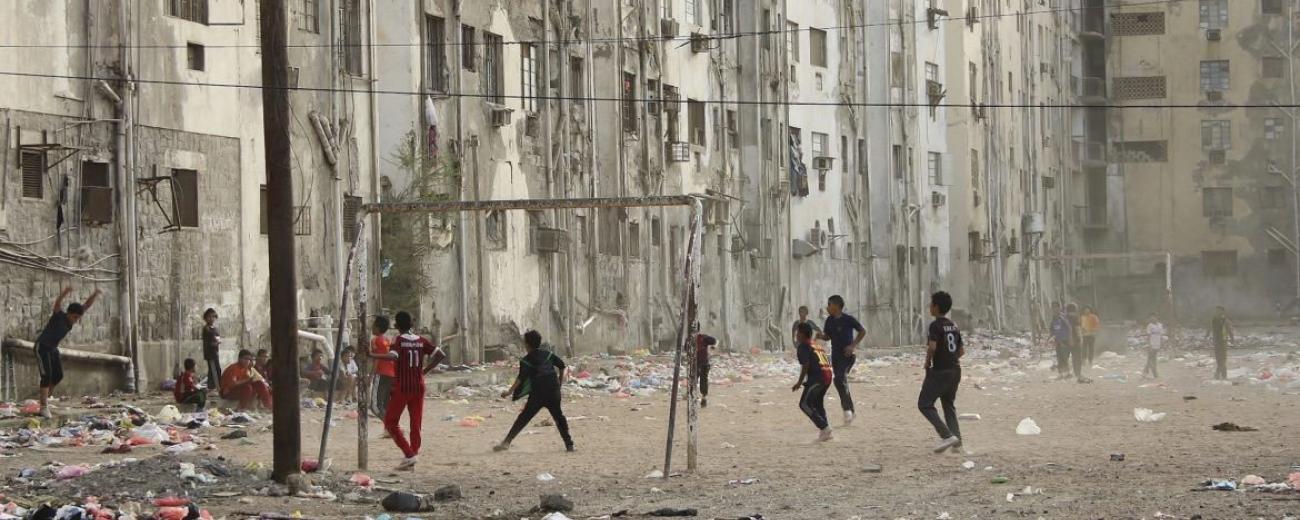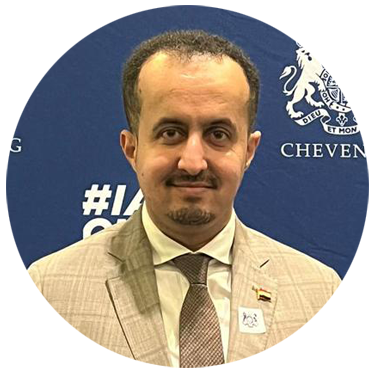How Hamzah is helping to empower the future leaders of Yemen using sport


Hamzah Alkamaly is the Deputy Minister of Youth and Sports in Yemen. As a mid-career professional, he chose to study MSc Public Policy, Finance, and Management as a Chevening Scholar at SOAS to help him empower the youth in his country to become future leaders.
From studying medicine to youth activism in Yemen
I was raised in Yemen and attended medical school in Cairo, Egypt. Early in 2011, when I was still in school, the Arab Spring took place, and that is when I first became active in public life. I postponed my course work that year to join other activists in Sanaa in their protests against the ex-president Saleh Regime. Moreover, during my last year in medical school in 2014, the Houthi militia launched a coup against the Yemeni government. I was among the opposition to this militia, and I started to appear as a political analyst on TV shows such as Sky News, BBC Arabic, and Al Jazeera.
Due to my political activism throughout this time, I was unable to return to Yemen as the Houthis had declared a death sentence on me. I decided to remain in Cairo for a while and became more involved in the public sphere and when the government was liberated, I went back to Yemen and was appointed as a Deputy Minister of Youth and Sports in 2017.
The power of sport in conflict recovery
At the onset of recovery from conflict, youth sports and activities were widely perceived as a luxury. Notwithstanding this, the minister, my colleagues, and I believed that it is an integral part of recovery, so we created the DDR Strategy, which stands for demilitarisation, deregulation and reintegration.
Sports provide youth with an alternative in the post-conflict recovery context, as it helps normalise life on the ground. Sports are an expression of how life should be, not only for those participating but also as a form of entertainment for people to escape from the lingering effects of war and violence. It also contributes to addressing the root causes of violence and extremism, thereby preventing the recurrence of conflict.
In expanding the scale of sports initiatives across the country, we aim to promote important values in Yemeni youth, notably unity, developing tolerance, respect and social inclusion. These efforts have demonstrated their complementary value to counter-terrorism initiatives that tackle extremism in conflict zones.
It also goes hand in hand with youth political participation. We believe that the future of Yemen belongs to its youth. It is estimated that about 70% of the Yemeni population is under 45 years old. We want to empower all youth to integrate modern ideas into policy-making in Yemen.
In short, our experience has shown that sports constitute a pathway to inclusion and building community cohesion in Yemen. As such, we recognise the significance of youth sports as part of a holistic approach to conflict resolution and peacebuilding in the country.
I do not consider my career a personal matter; I view it as a social responsibility. What changes do I wish to bring about?
Becoming a Chevening Scholar at SOAS
As a mid-career professional, I aspired to qualify myself in my field to help empower the future leaders of Yemen. I successfully applied for a Chevening Scholarship and chose to study MSc Public Policy, Finance, and Management at SOAS. I had heard that it was a very prestigious and diverse university. The way I was taught at SOAS was totally different from my undergraduate experience. SOAS stands out for its values and principles, critical evidence-based thinking, and practical application in the real world.
I came to the university with experience, but experience is never enough; it should be backed up by evidence and scientific understanding. My time at SOAS guided me on how to deal with, solve problems, and prioritise policies. SOAS does not teach you what to think; it teaches you how to think. It teaches you to be critical, listen to different perspectives, and not see knowledge as right or wrong. This helps both your professional career and personal life.
Meeting the world at SOAS
I had expectations that living in London would allow me to fully experience British culture and teach me about British society, people, and students. Nevertheless, I was somewhat taken aback when I arrived at SOAS by the multinational environment that I was going to live in. Similar to being in an international airport where you meet people from various places, backgrounds, and experiences. SOAS is a very inclusive place; my mentality, the way I think, and the way I tolerate other people have all changed because of SOAS. Although I am a traveller and travelled a lot for work, I have never missed a place like London, and I think that is because of SOAS. At SOAS, I felt at home, and it will always be my home.
It's easy to oppose but harder to make changes
I do not consider my career a personal matter; I view it as a social responsibility. What changes do I wish to bring about? I have frequently expressed opposition throughout my brief political career to youth direct political participation, and at times thought that we shouldn't have formal positions of authority. This is because I believed that we could still influence from outside the establishments, which proved not to be entirely right. I do not agree with this idea anymore. I believe that it's easy to become an element of the opposition, but it's even harder to become a decision-maker and a policymaker. If we want to make changes, we must be in charge.
If I gain any power, then youth in my country should equally have access to opportunities and resources to empower themselves. Our main goal is to end this war and have stability. Moreover, from this struggle, an inclusive democracy could be born that represents us. The future is ours. That's why my generation should maintain hope when reconstructing a country, especially a war-torn country like mine. We should not lose hope.



